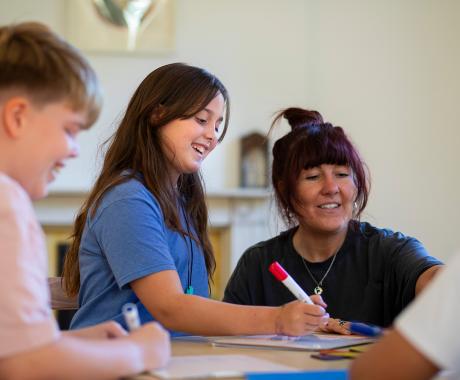Breaking Free from Academic Pressure: Rethinking Educational Choices to develop the Whole Child to Thrive
By Leanna Barrett, Head of Liberty Woodland School
As we navigate our children's education, the choices we make about schools can have a lasting impact on their development and future success. In a society that often equates academic achievement with value, many parents find themselves gravitating toward institutions that prioritise grades, standardised tests, and performance metrics. However, it’s time to pause and reflect: Isn’t society placing too much emphasis on academic pressure at the potential expense of our children’s holistic development? Shouldn't we focus on schools working towards striking the right balance between academic rigor and the kind of nurturing environment that fosters emotional, social, and intellectual growth?
The concept of the whole-child approach goes beyond mere academics; it emphasises the importance of nurturing emotional, social, and physical well-being. Yet, academic excellence remains at the heart of this approach. A rigorous academic environment can, in fact, work in tandem with holistic development, ensuring that students not only meet high academic standards but do so in a way that builds resilience, curiosity, and critical thinking. In my experience as an educator, I have witnessed the profound effects of this balanced perspective. Children are not just vessels for knowledge; they are complex individuals who thrive when they feel safe, valued, and engaged in their learning. Schools that focus solely on academic performance often overlook the emotional and social skills that are critical for long-term success. However, schools that provide academic challenges within a supportive environment allow children to excel both academically and personally, equipping them with the skills necessary for high achievement and lifelong success.
One very pressing concern is the rising incidence of anxiety and stress among children. A recent NHS report reveals that one in five children and young people had a probable mental disorder in 2023. This alarming statistic underscores the urgent need to address mental health in the context of education. The pressure to excel academically can lead to mental health issues that hinder not only academic performance but also overall well-being. That’s why a thoughtful, structured approach to academic rigor is essential. In a supportive environment, children should be encouraged to embrace academic challenges confidently, learning that it’s okay to ask questions and take intellectual risks. It's okay to fail and learn from failure. This creates a healthy relationship with learning that avoids undue stress, setting students up for both personal and academic growth.
A whole-child approach cultivates resilience, emotional intelligence, and adaptability—skills that are essential in today’s ever-changing world. Children who can recognise and articulate their feelings are better equipped to handle the pressures of life and make informed decisions. Schools that create an environment of open communication and emotional support empower children to express themselves and develop coping strategies, ensuring they are not just academically proficient but emotionally resilient as well. When this environment is paired with academic rigor, students not only achieve high standards but also learn to navigate challenging material with confidence. This combination prepares them for future academic and professional success, where intellectual agility and emotional resilience are key.
As parents, we must challenge ourselves by asking: how do we define success? Is it merely about high test scores, or is it about raising well-rounded individuals who can navigate the complexities of life with confidence? True academic success goes beyond grades; it includes building the intellectual discipline, problem-solving abilities, and perseverance needed to succeed in complex and demanding fields. Children who participate in extracurricular activities, explore their interests, and learn to balance various aspects of their lives are more likely to develop the skills necessary for future success. In a rapidly evolving job market, employers increasingly seek individuals with strong emotional intelligence, adaptability, and critical thinking abilities—qualities that are cultivated in a nurturing, holistic educational environment. Academic rigor within this environment ensures that children learn to meet high standards, think critically, and approach their future goals with a strong foundation of knowledge and resilience.
By fostering a balance between academics and personal development, parents can help their children flourish. Encouraging effort and growth, rather than focusing solely on grades, allows children to develop a growth mindset. Celebrating hard work, perseverance, and progress instils a sense of pride and confidence, teaching children that their worth extends beyond their academic achievements. This shift in focus not only enhances mental well-being but also prepares them for future challenges. An emphasis on rigorous academics within this context encourages students to aim high and develop the persistence needed to succeed in demanding academic and professional environments.
As parents, it is our responsibility to model healthy coping strategies. Demonstrating how we manage stress, set goals, and maintain balance in our own lives provides our children with tangible examples of resilience in action. Our behaviours and attitudes significantly influence their approach to challenges and opportunities.
In my role at Liberty Woodland School, I have seen firsthand the impact of a whole-child approach. Students who feel supported in all aspects of their lives are more engaged, curious, and eager to learn. They develop not only academically but also socially and emotionally, preparing them to thrive in an ever-evolving world. Academic rigor is fundamental in this approach, encouraging students to set high standards for themselves, take on challenging material, and work toward excellence within a supportive and balanced environment. This combination ensures that they are well-prepared to achieve academic success and thrive in future endeavors.
As we make decisions about our children's education, let’s critically evaluate whether schools that prioritise academic pressure at the expense of personal development are truly the best choice. A holistic education that values emotional well-being and personal growth equips children with the tools they need to navigate the challenges of the future. By fostering an environment that encourages creativity, resilience, and emotional intelligence, we pave the way for our children to succeed—not just in school, but in life. In this environment, rigorous academics are part of a broader approach that values excellence, resilience, and intellectual curiosity, ensuring our children are prepared to thrive in every facet of life.
It’s time for us as parents to ask ourselves: Are we choosing the right path for our children? By embracing a whole-child approach, we can nurture not only their academic potential but also their happiness, well-being, and success in the exciting future that lies ahead.



